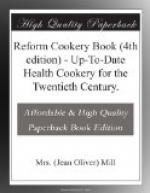Another need which I, as a Scotswoman, feel remains to be met, is a work to suit the tastes and ideals of Scottish people. Cosmopolitan as we now are, there are many to whom English ways are unfamiliar. Even the terms used are not always intelligible, as is found by a Scotswoman on going to live in England, and vice-versa. We could hardly expect that every London stoneware merchant would be able to suit the Scotch lass, who came in asking for a “muckle broon pig tae haud butter;” but even when English words are used, they may convey quite different ideas to Scottish and English minds. Indeed, several housewives have complained to me that all the vegetarian cookery books, so far as they can learn, are intended solely for English readers, so that we would hope to overcome this difficulty and yet suit English readers as well.
Before starting to the cookery book proper, I would point out some of the commonest errors into which would-be disciples of food reform so often fall, and which not unfrequently leads to their abandoning it altogether as a failure. Nothing is more common than to hear people say most emphatically that vegetarian diet is no good, for they “have tried it.” We usually find upon enquiry, however, that the “fair trial” which they claim to have given, consisted of a haphazard and ill-advised course of meals, for a month, a week, or a few days intermittently, when a meat dinner was from some reason or other not available. One young lady whom I know, feels entitled to throw ridicule on the whole thing from the vantage-ground of one day’s experience—nay, part of a day. It being very hot, she could not tackle roast beef at the early dinner, and resolved with grim heroism to be “vegetarian” for once. To avoid any very serious risks, however, she fortified herself as strongly as possible with the other unconsidered trifles—soup, sweets, curds and cream, strawberries, &c., but despite all her precautions, by tea-time the aching void became so alarming that the banished joint was recalled from exile, and being “so famished” she ate more than she would have done at dinner. Next day she was not feeling well, and now she and her friends are as unanimous in ascribing her indisposition to vegetarianism, as in declaring war to the knife—or with the knife against it evermore.
Now, there are certainly not many who would be so stupid or unreasonable as to denounce any course of action on the score of one spasmodic attempt, but there are not a few who are honestly desirous to follow out what they feel to be a better mode of living, who take it up in such a hasty, ill-advised way as to ensure failure. It is not enough merely to drop meat, and to conclude that as there is plenty food of some or any sort, all will be right, unless it has first been ascertained that it will contain the essential elements for a nourishing, well-balanced meal. It is not the quantity, however, which is so likely to be wrong as the proportions and combination




